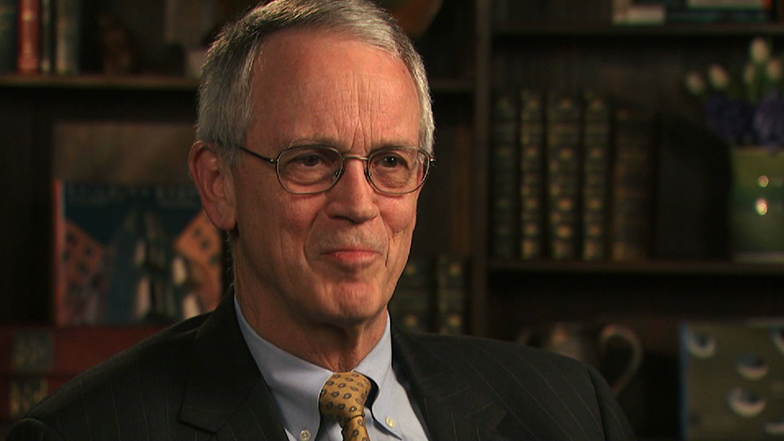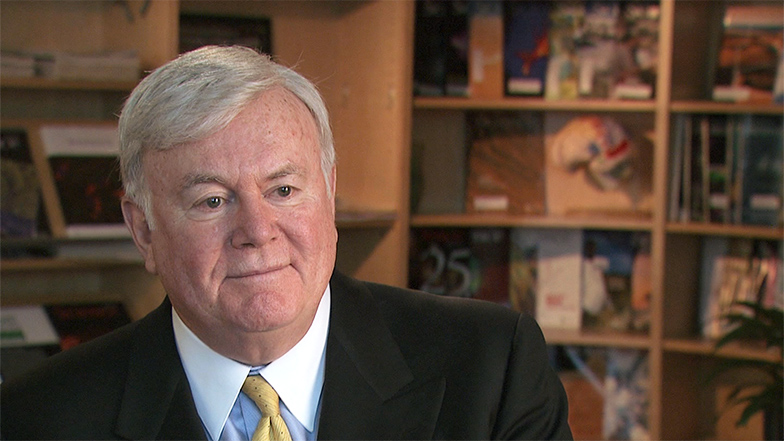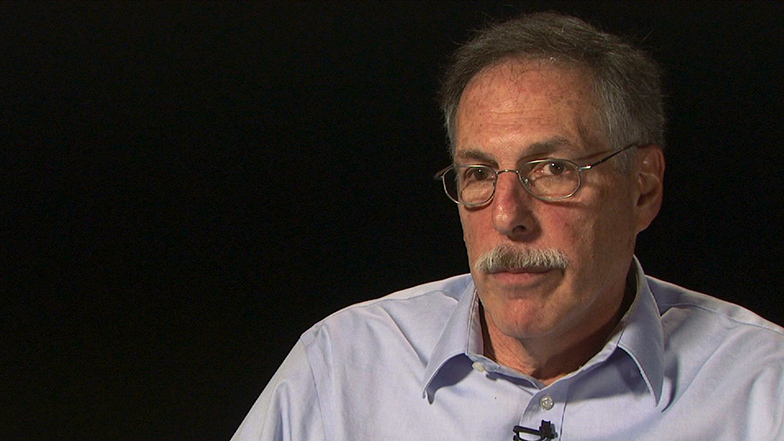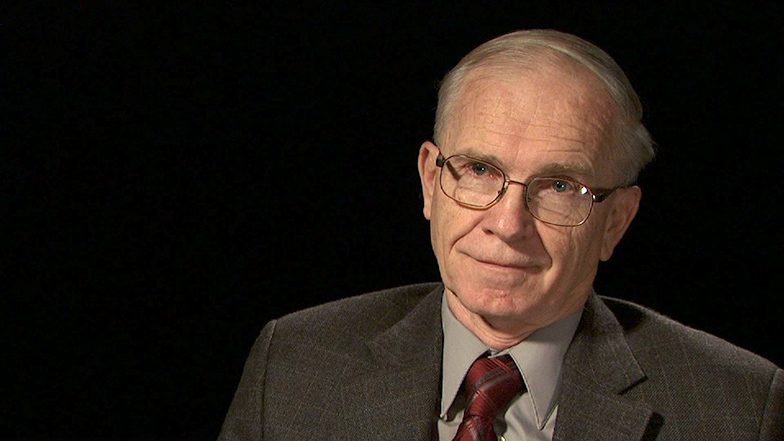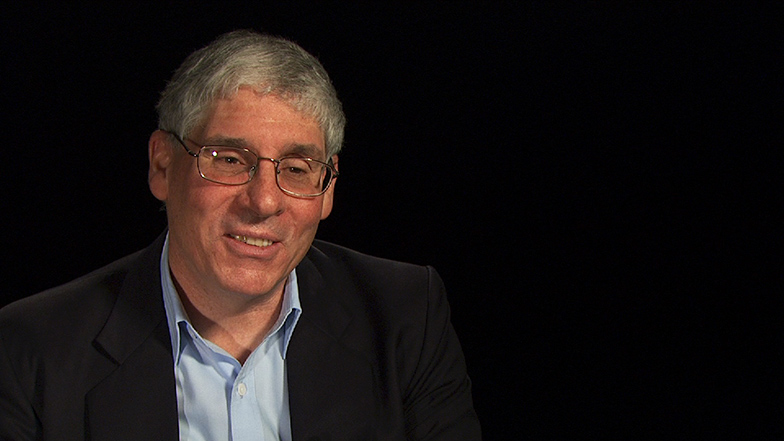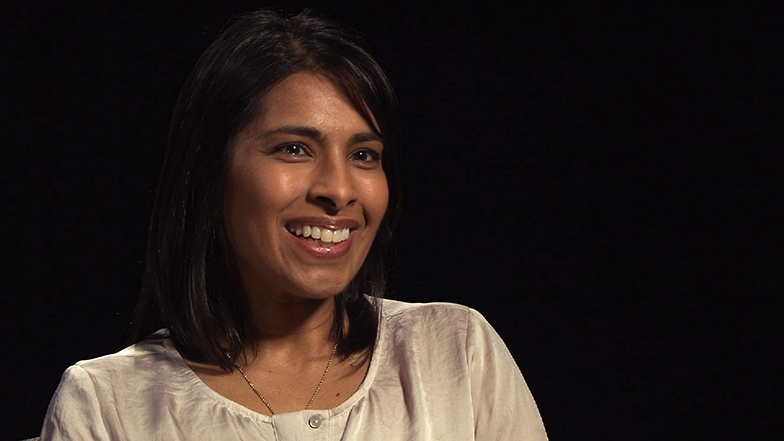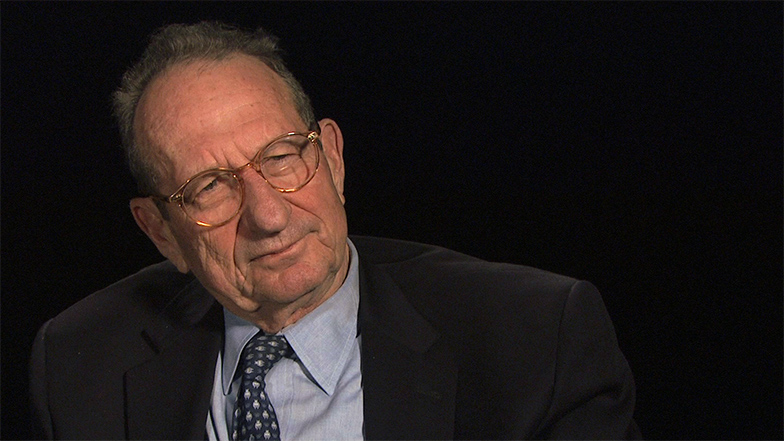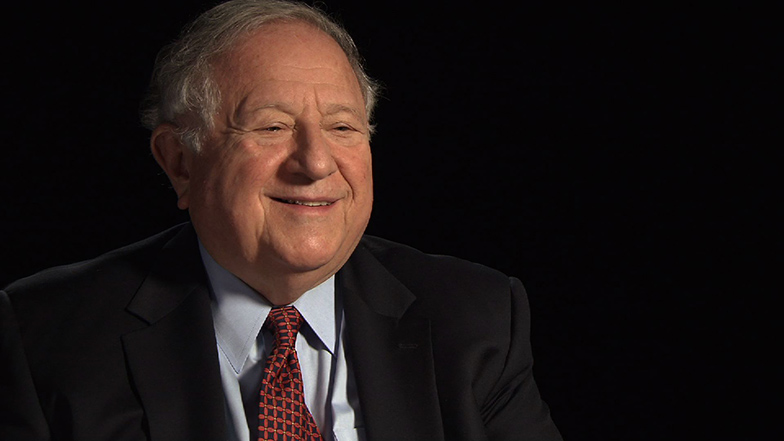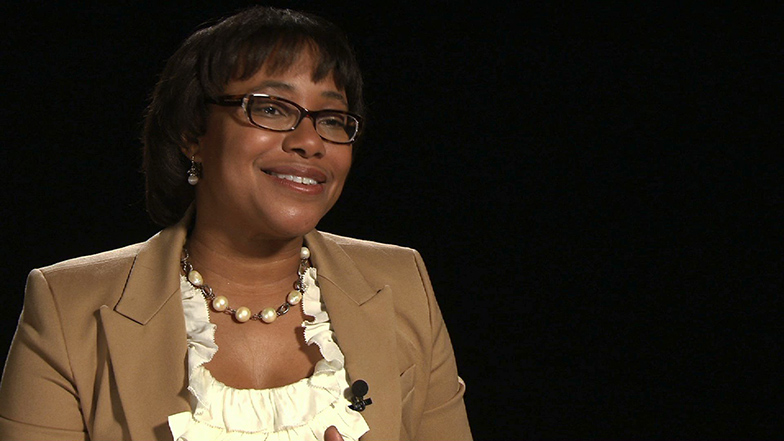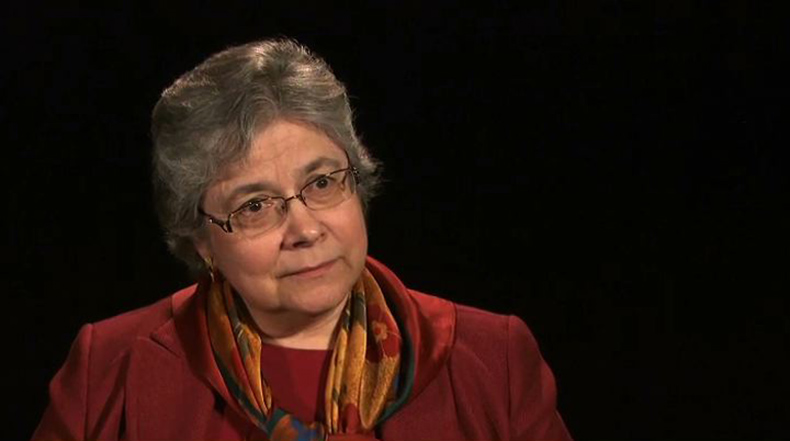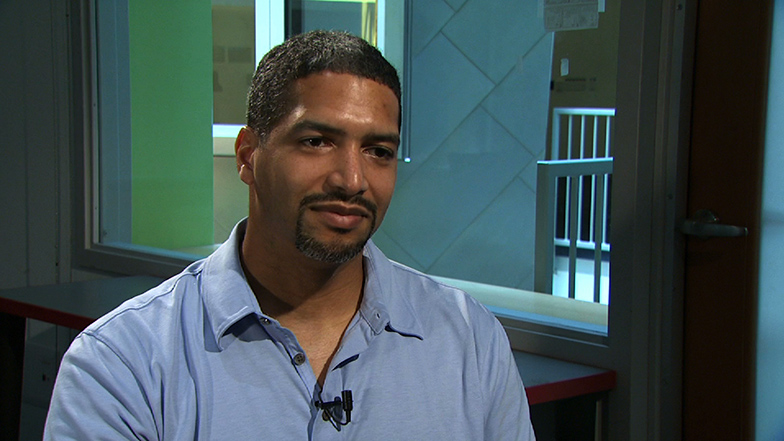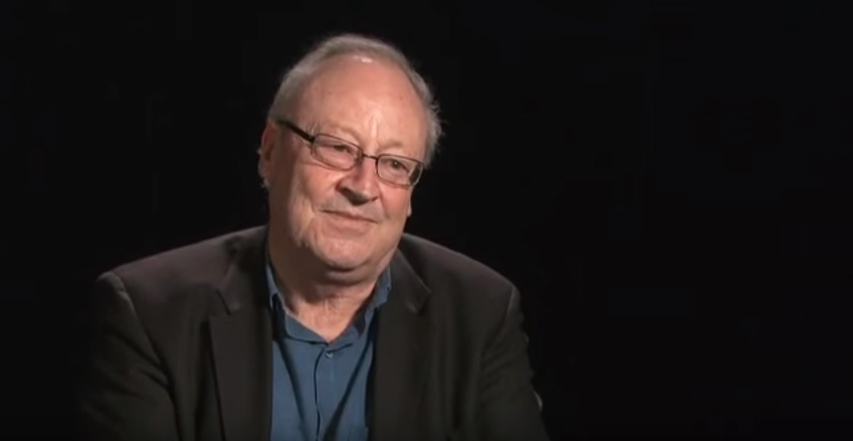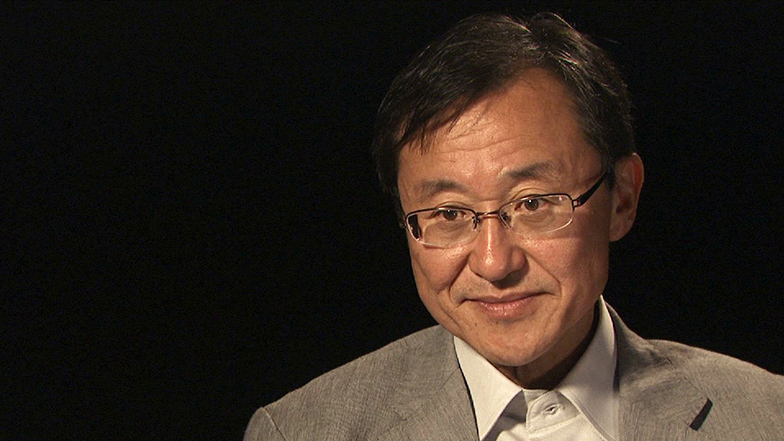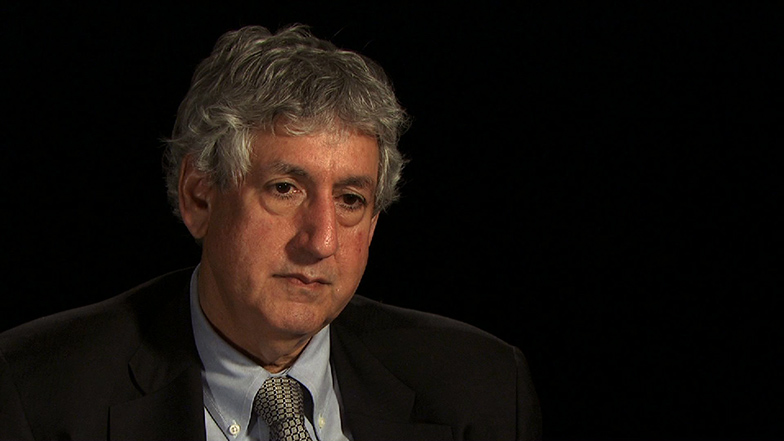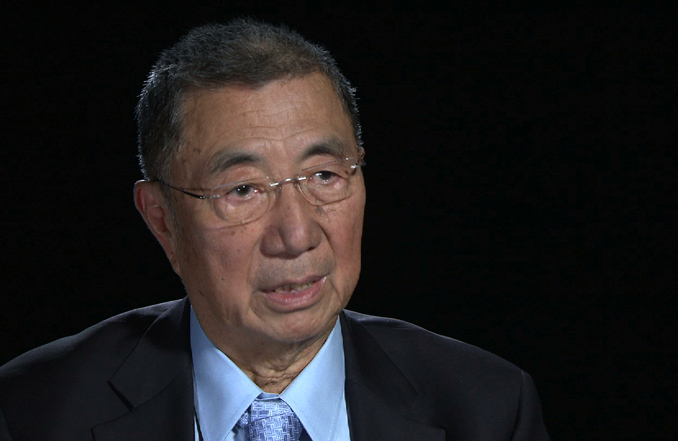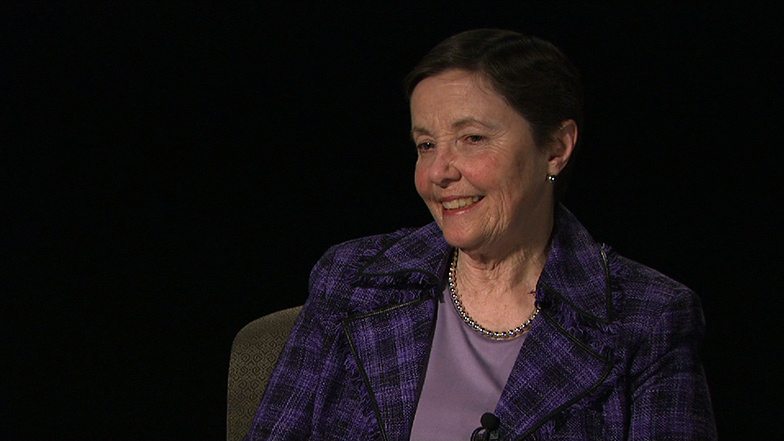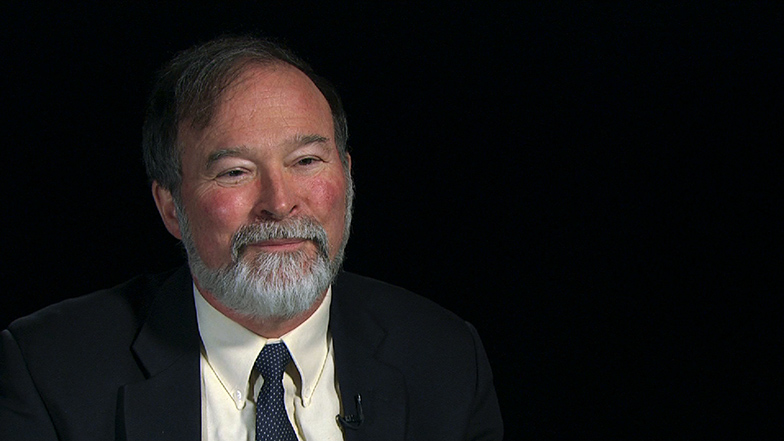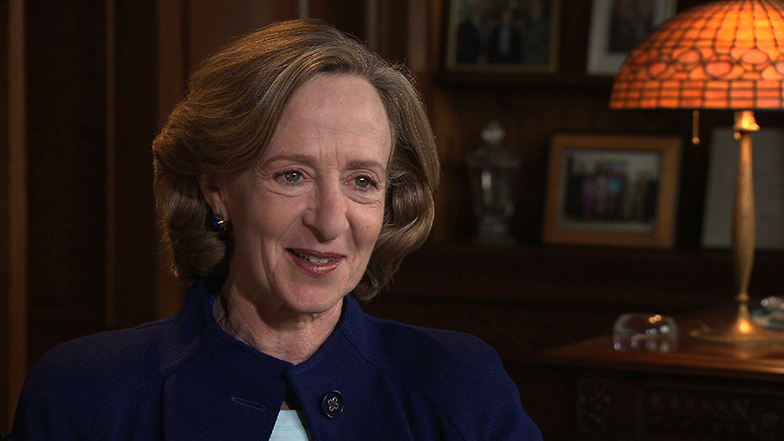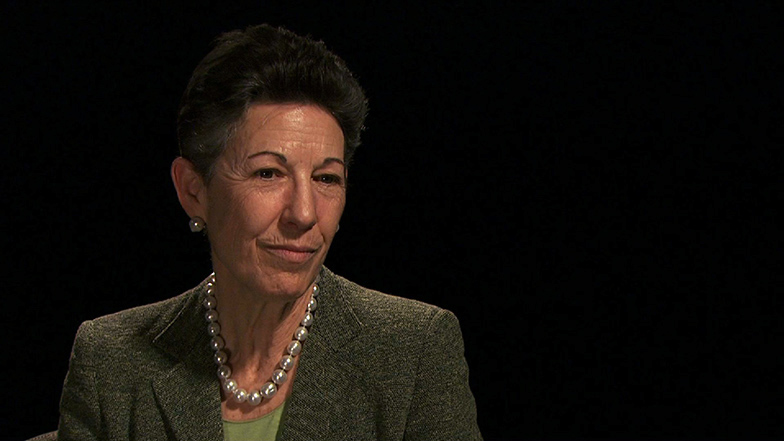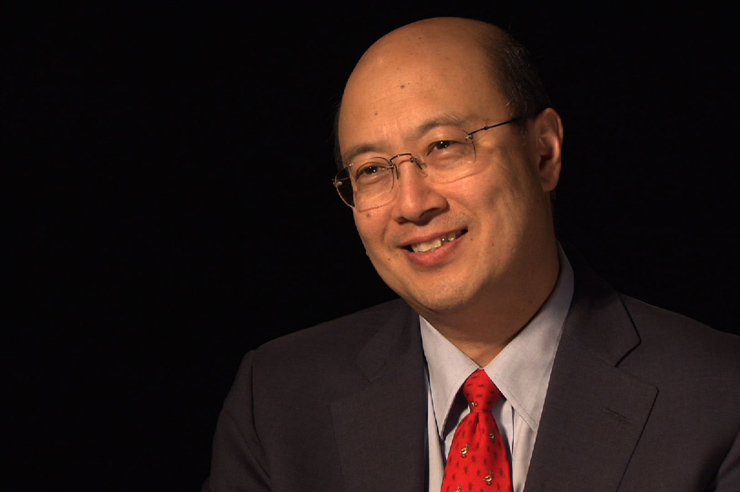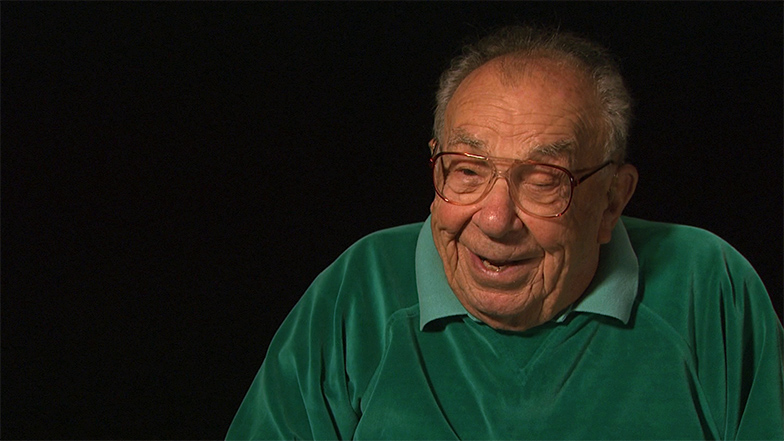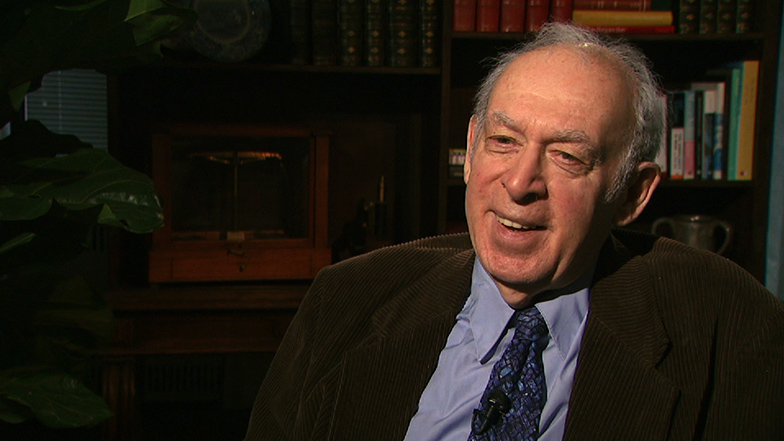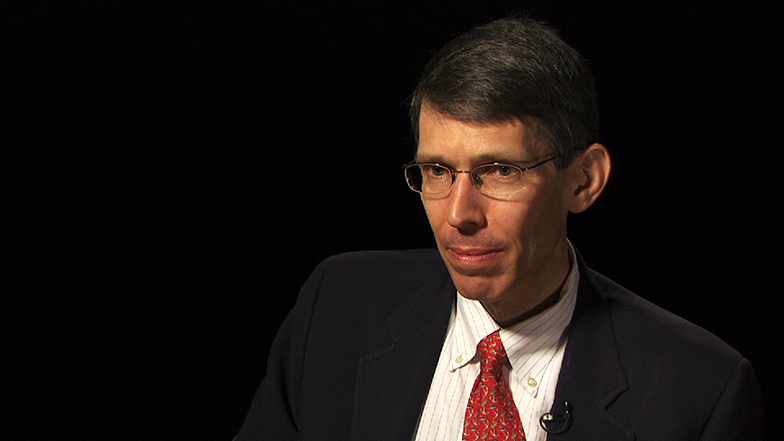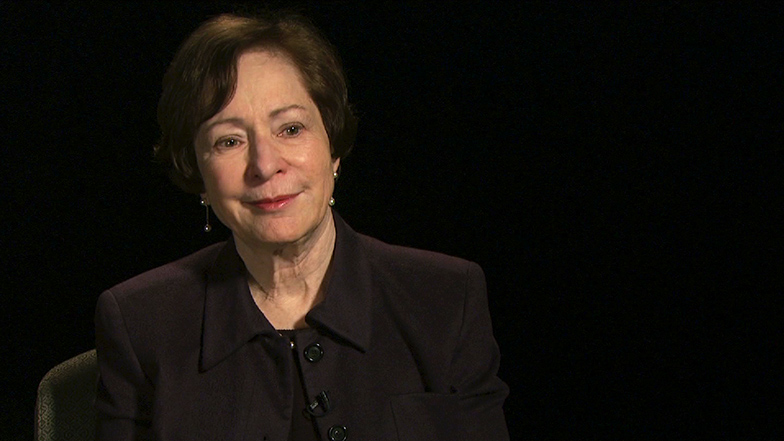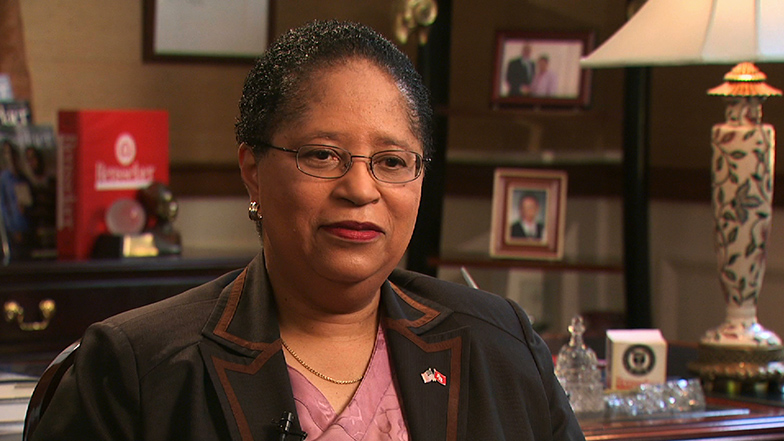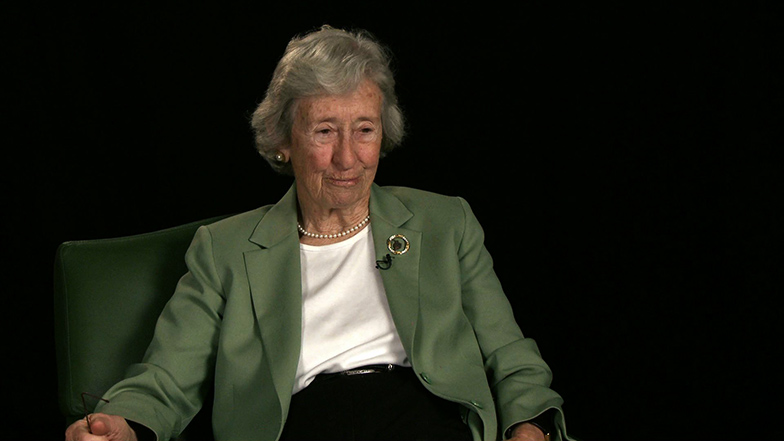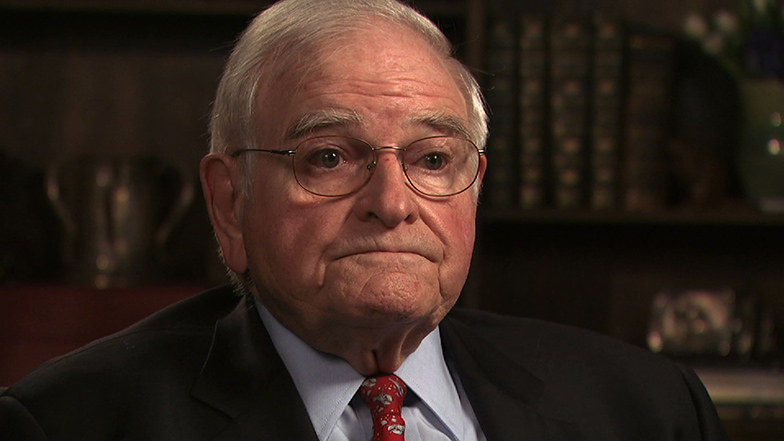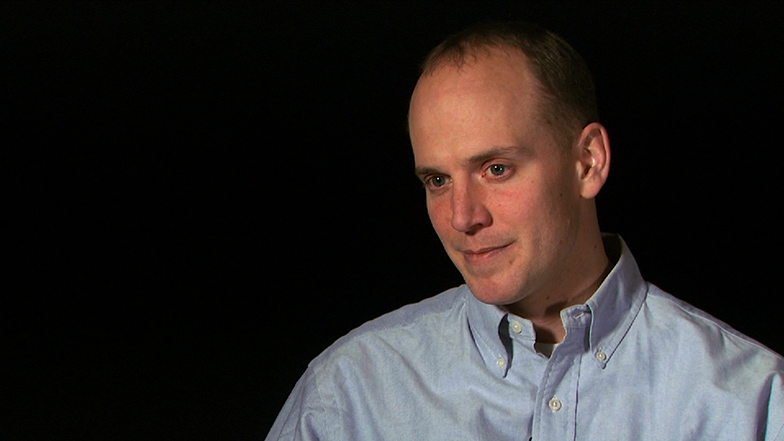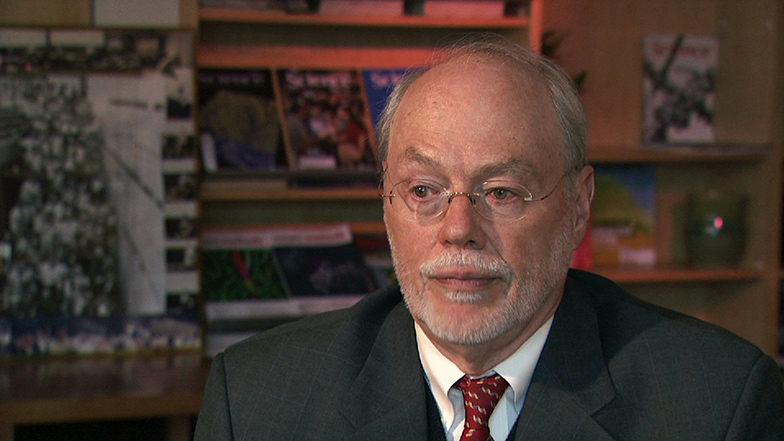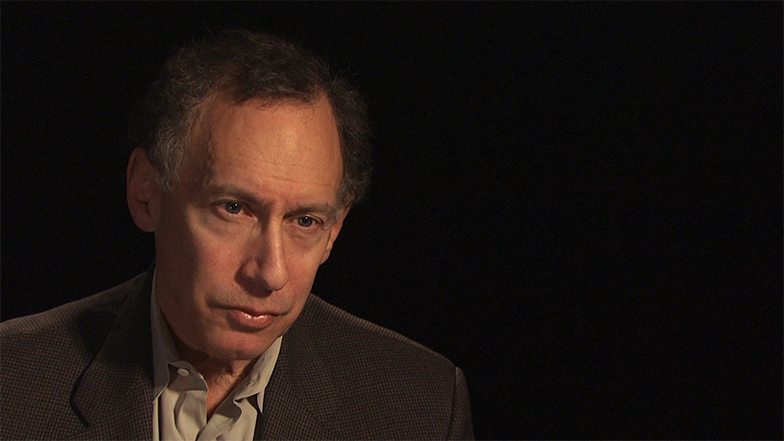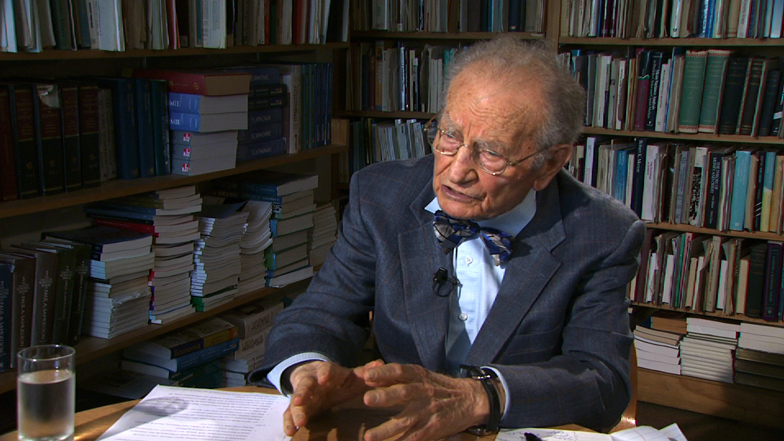Suzanne Berger
INTERVIEWER: This is the 150th anniversary interview with professor Suzanne Berger. And the first question I have is where were you born and where did you grow up? And the one thing I forgot to mention is if you just keep looking, keep your eye contact with me, and ignore the camera.
BERGER: Okay. Well I was born in Madison, Wisconsin, where my parents were graduate students. It was at the very end of the Depression. And actually, my father was getting a PhD. Not because he ever intended to get one, but because there were just no jobs. And since he was a good student, he stayed in school. And so he was a microbiologist. But I grew up in New Jersey. And then left only to go to college.
INTERVIEWER: Were there any particular experiences or influences when you were a child that you think pointed you in the direction that you took in your career?
BERGER: I think my -- it was a household that truly -- that truly respected and honored, above almost all other things, learning and curiosity. And even above any kind of practical success in the -- success in the world. I remember my grandmother telling me a story about having gone out on a date, I guess, with a young man. And the young man telling her that he had been in the paint crew that had painted the inside of Rockefeller Center. And her telling her father about this. And her father said, so what's so great about being a painter? Why doesn't he spend more time studying? Well studying in those days would have been studying Torah, being a religious scholar. But that idea that what was most worthwhile in the world was somehow understanding, learning. And that material success was not highly valued in our family.
INTERVIEWER: Where did you decide to go for your undergraduate studies?
BERGER: So I first went to Antioch College. And then I transferred to the University of Chicago. And I still think that the University of Chicago was just about the perfect undergraduate education. At least for someone who is going to be a social scientist or humanist. At this point, I can't help but believe that MIT for someone in engineering and science would probably be the best. But the University of Chicago was an intensely serious place. Where in the class philosophy, we would read ten pages of Plato. And all of the discussion would focus on is he right, is he wrong? What is his idea? What exactly does he mean? And 10 pages of Plato is about all you can really absorb, if you're truly trying to understand. So that when later I went to graduate school at Harvard. At Harvard, where you know whole books would be assigned. And then maybe three or four critiques. And the question wasn't was Plato right or wrong, but what did professor A or what did scholar B have to say about Plato? And what's the controversy over Plato? Somehow it seemed to me to lack the intensity, the seriousness, of my University of Chicago education. And I found graduate school kind of a depressing experience, after sort of the illuminating, kind of mind opening experience of Chicago.
INTERVIEWER: So what made you decide to go on to Harvard for graduate study?
BERGER: I just loved what I was doing at Chicago. I can't say that I really knew exactly what I wanted to do as a profession. I just wanted to do more of what I was doing. And as I look around at a lot of colleagues, they're not people who ever consciously decided that they were going to be professors or researchers. They're people who got captivated by an activity. And just tried to do whatever they could to continue doing this thing that seemed to them to open up big -- the opportunity of looking at the big questions about the world. The things that really mattered. And so I would say I just kept doing what I was doing. I'm not aware of ever having made a real decision.
INTERVIEWER: What was it about political science that interested you so deeply?
BERGER: I think political science has some of the biggest puzzles in life in it. How could it be, for example -- no one really -- or very, very few people -- want to fight in war or be in wars. Either kill people or be killed. If you ask people, everyone would say, you know, we ought to get rid of war. And yet somehow, it's proved over thousands of years absolutely impossible to solve this problem even a little bit. How is it that something, where if you asked each individual what their preference is, you would have an overwhelming majority of -- an overwhelming consensus on the answer, but collectively we're unable to achieve this objective?
Political science is filled with puzzles where you cannot understand how, given what individuals individually would seek, how we come out with the kind of collective social solutions we have. And I think the best in social science is about trying to understand the gap. And trying, if you're a more policy minded person, to figure out how you might bridge that gap between things that most of us could recognize as desirable. But have somehow proved to be almost unattainable for us as a society.
INTERVIEWER: While you were in school, did you have any particular mentors or influential professors?
BERGER: Yeah, I think at each stage there was somebody who played a role that was really quite decisive. As an undergraduate, when I was at Antioch, briefly for one year, my freshman year, there was a political scientist whose name was Heinz Eulau. And Eulau was very, very interested in what would call behavioral social science. Sort of questioning individuals and trying to build out of individual, traits about legislators, in his case. Trying to understand the political process, building up from individual properties of the legislators.
And Eulau was really a first class researcher, but who happened to be, I think as he saw it, stuck in a midwestern little college, without the kind of graduate students who could have helped him on his research. So he chose what he had at hand, and that was a group of four of us, one a freshman, that was me. And he sent us out interviewing Ohio state legislators. And we had to track them down in their farms and their factories. And we had these long questionnaires to administer. And to have that opportunity as a freshman, of really being involved in a research team, and being able to do field research, and being able to interact with a professor, over a concrete research project. It's what MIT tries to do now with UROP.
But for me, that experience was fantastic. It was kind of funny that years later -- I mean he left and went to Stanford, and I left and went to the University of Chicago.
And I met him years later when I already had tenure at MIT. But within political science, I had taken a direction very different than the one that he had been pushing. And he looked at me and he shook his head and he said, Suzanne, what ever happened to you? I got you in on the forefront of the behavioral revolution. What happened to you? It was such disappointment. Here, by my lights, I had been a great success. I had a tenured job at a major [INAUDIBLE]. What ever happened to you? You were on the forefront of the behavioral revolution. But still that experience -- it's kind of funny. At that point I could look at it as funny. I don't think I would've thought it was very fun as a graduate student.
INTERVIEWER: Yeah. People do have their own prisms. Let me ask about each of the particular areas of interest that you have. Let's start with European politics and economy. What is it that's so intriguing to you? Why have you been drawn to that area of research?
BERGER: There, also, there was a mentor who was very important. When I went to Harvard as a graduate student, I thought I was going to work on Soviet politics. And I guess my reasons for getting into that were kind of weak. I had taken a lot of literature courses at the University of Chicago. Tolstoy and Dostoevsky and I'd been intrigued and somehow I'd been pulled into an interest in Russia.
But when I arrived at Harvard, I discovered that the faculty working in the Soviet Union believed that they had totally figured out the society. And each graduate student -- it was like one of those color in the dot pictures. They had the picture. They had the big design. And each student was going to be assigned a little piece that you got to color in. So one would be assigned to work on state farms. And another would be working on the Soviet youth movements, or something like that. And so it just lacked all intellectual challenge and interest. And so even though I'd learned Russian in order to be able to pursue this, I quickly felt that this -- I felt very, very uninspired to continue this way.
And I had, more or less by accident, started taking classes from a faculty member called Stanley Hoffmann, who's still alive and doing very well today. And he was teaching about French politics. And what Hoffmann was able to do was to show you that history and political history is a storehouse of experience about how human beings have tried to deal with some of the most difficult questions of organizing people in society. And I was absolutely fascinated by the way in which he was -- he could pull out of these old quarrels in France, issues that were just fundamentally important, even for us today. And above all, the way in which he could use French experience as a kind of mirror that we could look in, as Americans. It was a society in many ways like us. And yet, people who had come up with altogether different kinds of solutions to the kinds of issues that were important in the United States. And so it was kind of almost by accident that this truly inspiring teacher -- kind of that I met this person, at a point when it I, myself, was searching for an intellectual direction.
And so my very first project was on French peasants. And I thought that -- this was 1960s. And at that time, the dominant paradigm in political science was that as economic and social life became more modern, as people got better educations, as their incomes rose, as they used more modern technologies -- that their political behavior, their attitudes, their voting patterns would also change. They'd be dragged along, basically, by economic and social change. And so politics seemed to be just a kind of derivative of changes in the economy and society.
And that was in fact one of the things that I'd found most interesting in Professor Hoffmann's approach. That he did not see politics as just a kind of residue. Something that was just determined by economic and social change. But he understood politics as a sphere of autonomous relations. In fact, he saw politics as something that could shape the economy and shape society, rather than just determined by -- just determined by economy and society.
And so I thought, here I go find a group of peasants. Of backward peasants in France. People who were -- who at some point A in time had had lousy farming techniques, little equipment, low levels of education. And try to study how they would change as that community got more modern farming techniques, became more connected to the center, et cetera. And so I did, in fact, identify a set of farming organizations in western France, in Brittany.
And it turned out that there was an organization that had been created right after World War I that had a newspaper. And this organization put out a newspaper first every month, and then it started being every week. And I could read the newspaper. When I actually went to Brittany, it turned out that they had rooms full of archives of the organization. And I was able to -- the organization was still going. And I was able to interview 90 of the leaders of this organization, in order to study over time the changes, and try to see was it really true that as the economy changed, that the politics of this area changed.
Well, to make a long story short, in fact it turned out that far from changing, their politics had been consolidated and strengthened. And that the whole puzzle became to understand how is it that people voted in this area, really the way they had 50 years earlier? And in fact if you took a map of which were the parishes that had been for or against the French Revolution in 1793. And we had a pretty good measure of that. And overlap that over a map of left right voting in the 1960s in this French department. It was pretty much the same. So the puzzle became not to explain change, but to explain this remarkable continuity. How had it happened? And so this was really my first big project. And the first big puzzle.
INTERVIEWER: Let me ask about government business relations in industrial societies.
BERGER: Well, I guess out of that first peasant project, I got to be quite interested in traditional classes, social groups, and businesses, that you would think should have disappeared with modernization, but don't. Should we just look at them as a kind of lag phenomenon? Or is something else going on here? And that was -- that puzzle was at origin of work that I did with three other MIT faculty. Michael Piore in the economics department, Lisa Peattie who was an anthropologist in DUSP, and Martin Rein who was a sociologist, was also in DUSP.
And we all became interested in a phenomenon we called dualism. That is, how is it that in modern society, you can have the coexistence of very modern structures and businesses, and still the survival of what seemed to be kind of small scale, very traditional enterprises. Is it just a lag that will be eliminated with time? Or, as we came to think, are these traditional businesses, more small scale things, being deliberately preserved and protected by government because they serve important social and political functions? Political functions, for example, by keeping social unrest, they employ a lot of people, so they prevent unemployment from going up. So small shops can absorb a lot of family members who otherwise might be unemployed factory workers.
So we started -- and that was the second big project. And it was done with these three other MIT faculty. And I think that I was beginning to appreciate all the pleasures of MIT and the opportunities it makes available for working across your discipline and across your department with people elsewhere in the Institute.
INTERVIEWER: And how did you get interested in national and international security?
BERGER: Well that was another accident. Just to say that out of that project on dualism, Michael Piore, who's an economist, and I, we started realizing that the basic theories in our fields, economics and political science, did not account very well for some of the phenomenon that we were seeing. And so we started trying to look at those theories to understand what in these theories -- What do they (theories) allow you to see clearly? What are the lenses you put on with each theory? What do you see clearly? What is it you don't see so clearly? And as we had those discussions, we realized this would be a good course to organize for students.
So this must be 25, 30 years ago. We started teaching a course that we called Political Economy I. And that course we're still teaching. And it's a graduate seminar. But we get 30 students in that seminar. And they come equally from Sloan, from political science, economics. Now we have a contingent of Kennedy School students who come up from Harvard for that course. That course continues to intrigue people in the same way that those puzzles intrigued us.
So we called each of these different family of theories paradigms. So we looked at the liberal paradigm, Marxist paradigm, cultural paradigm. And I tried to explain -- a friend of mine who was in Washington, who was then assistant secretary -- had been assistant secretary of the Navy in the Carter administration. I tried to explain to her what it was we were doing. And I used the example of how each paradigm -- if you were looking, let's say, at the Soviet Union, would show you a different part, or come up with a different idea of the Soviet Union. Which would suggest a different kind of policy response in a part of the United States.
And she said, "Suzanne, you ought to be teaching -- you know, our people, our smartest people in the military can only ever understand one best solution. They think that given the facts, there's always one best idea, one best way of following things. So it would really just be eye opening for them to realize that from the same facts, depending on what glasses you put on, you might see different things." And so together -- her name was Mitzi Wertheim. Together with Mitzi, and actually someone who was a very senior member of the defense establishment, Jake Stewart, we created a seminar. Seminar 21, we called it, Looking Towards the 21st Century.
And we -- Mitzi and Jake asked the joint chiefs of staff if they would suggest the absolute best and brightest in their various services to participate in this seminar. And not the intelligence officers, but people who really were heading for the top. And if they would do that, we at MIT would provide the best of our faculty to come once a month for nine months to try to show how these different paradigms could shape [INAUDIBLE] understandings of central problems and areas and parts of the world and themes for these people.
And up till now, this seminar continues. I did that for seven years. And it continues with other faculty -- have taken it over. And we've now had more than 1,200 very senior people from each of the military services. NSA, CIA, state department. We've now added NGOs as well, because they play a central role in areas of concern for security. So that was a different adventure.
But I can see how that grew out of our dualism project. How that grew out of my peasant. So even though, apparently if you looked at these activities on paper you don't see the connection, in my mind they're connected. And in fact, connected to, well, the research support we had for that dualism project came from the Ford Foundation. And if Ford said, what good was our support to you? I guess answer number one would be, well we published a book. But I think if you look at the long term impact of that research funding, first of all it created that class that still goes on. And I can look -- I can see the impact of that class in the research of my students over the years. It created this seminar. Though Ford would probably never even be able to see that. But I know that that's how it worked.
INTERVIEWER: And is there a link between all of this and globalization?
BERGER: Ah. Globalization. I guess that was another accident made possible by MIT. At the end of the 1980s, it was a very bad time for the US economy. And President Gray, Paul Gray, looked at what seemed to be the losing battle of US industry to compete at that time with the Japanese. It looked like the Japanese were just eating our lunch in fields like electronics, automobiles, in which Americans had been leaders for a long period of time. And he said there's a huge problem for the American -- for the United States. And MIT ought to be able to analyze this and to come up with some solutions.
And so he asked 16 faculty from completely different fields to participate in this project. And the leader of the project was Michael Dertouzos who was the head of the lab for computer science, which is now CSAIL. And Robert Solow, who later won a Nobel Prize. So that was the Commission on Industrial Productivity.
And I just have to tell you a little about the commission because -- Well first of all, Michael Dertouzos was a fantastic leader. And he really was able to get these 16 prima donnas to actually work together. And I say prima donnas -- we started the commission by everybody offering their favorite explanation of what the problem was. And there must have been 80 different explanations from the Americans have lost the Protestant work ethic. We're too litigious All our energy goes into suing people in courts. And on and on and on.
And at one point, Paul Krugman was a member of this group. And at one point, Krugman shouted, I don't want to hear the word competitiveness once again. It's a nonsense word. It means nothing. Depending on the level we set the dollar, the United States could be selling cotton T-shirts in Sri Lanka. And the dean of engineering, who was in the room, stood up and shouted, I always knew there was something deeply wrong with economics. And now I see it. So you had these fundamentally different world views here.
And Michael Dertouzos brilliantly realized that there had to be a different way of going about this. So he broke us into teams, and said you've got to go study particular industries, and then we'll build our analyses from the bottom up instead of this top down approach. And that's really how I started doing the kind of research on industries from the bottom up -- that really, I would say, from the end of the 1980s has become the basis of all the subsequent work that I've done on globalization. So there too it was a kind of MIT product.
INTERVIEWER: And then I have one more -- comparative politics. Which sounds like it would be closely related as well.
BERGER: Well comparative politics. I think in a way I've answered that by talking about Hoffman and the kind of insight that how much you can -- how much -- it seems inevitable to us, once you look at how other societies organize things, you realize that what seems to you inevitable in life, is not inevitable at all. There is another way of tackling this problem. Or another way of organizing.
Take something like training and education for workers. In the United States it seems absolutely self evident that companies have little to gain from investing in their workers. Because the workers then can move on to another company, and the company loses its investment in education and training the workers. And when you ask US company managers why they do so little for developing the skills, they say, well because we'll lose those people. They'll go off -- they'll go off somewhere else. And that just seemed to be a fact of life.
Until you go to Germany and Japan, work companies invest -- and very very heavily -- in worker training and skills. And they have a way of trying, in fact, by creating a common reservoir of skilled workers to make sure that no one company does all the investing, while others are able to free ride on those who invest. So what seemed to be a kind of a immovable fact of life suddenly takes on a whole different sense of possibility and opportunity, if you look at German and Japanese patterns. That's just one example.
INTERVIEWER: Okay. So let's back up a little bit. And why don't you tell me how you wound up at MIT.
BERGER: Well the true story is I was -- I -- After I got my PhD at Harvard, Harvard then, in those days, hired only its own junior faculty, faculty from its own graduates.
And the experience of being a graduate student at Harvard was hard. You felt no one ever really noticed what you were doing. And so when you were appointed as a faculty member, it felt like holy oil had been poured on you. Suddenly you felt incredibly special. So I hadn't really thought very much. I was offered other jobs at that time. But it just felt so special to have been chosen by Harvard, that without really thinking much about it, I signed up and agreed to start there.
And as I, though, became a junior faculty member, I realized that -- I realized that at Harvard, there are 12 junior faculty for every one tenured faculty member. And that's a kind of fixed ratio. It began to appear to me that this, perhaps, was not going to be for the long term a very good solution. And it might be best to leave at a point of my choosing, rather than wait, eventually, to be kicked out.
And so about two years into my assistant professorship, opportunities presented themselves at MIT and at Yale. And I really didn't know much about MIT for a social scientist. I'd sort of thought of it as others did as an engineering and science school. Except that I had one very good mentor who I'd had as a professor at Chicago. Professor Myron Weiner, who was here. And as I started to talk with him and his colleagues, I realized what an exciting place MIT was. And so I moved, after two years as an assistant professor at Harvard, I moved to MIT.
And I've never regretted it. And any time that I've had other opportunities to go other places, MIT has always seemed a very compelling place to remain. The one truly tempting opportunity had been I once had an offer to go to join on a permanent basis the Institute for Advanced Studies at Princeton. And at that point, I'd gotten to know provost Walter Rosenblith pretty well. So I went to discuss this with him. And he ended this conversation in about three minutes, or this particular line of inquiry by saying, Suzanne, you know you love teaching. You can't be seriously thinking about this. And that was true. I really did love teaching. And you know, as I think back about that conversation, many other administrators would've tried to offer a higher salary or a faster promotion, or something like that. But Walter just zeroed in on the thing that he understood was my real attachment to the Institute. And I stayed.
INTERVIEWER: Can you talk a little bit more about what it is about the environment here that keeps you here?
BERGER: Well, I really like the fact that MIT, hierarchically, is a very flat place. And that in a number of ways. First of all exactly because departments have a fixed number of faculty, but we're not required to have any fixed ratio between tenured and junior faculty. It means that any junior faculty we hire, we hire with the anticipation, expectation, that if they continue to do work as good as we've seen, that they will remain.
So that enormous hierarchy that exists between tenured and junior people at places like Yale, Princeton, and Harvard. That doesn't exist at MIT. There is a difference between more senior and more junior people. But it's not -- it just isn't that steep. And so we treat junior colleagues as if they are really colleagues, and hopefully people who will be there for the long stay. So that's flatter.
I think the MIT administration is just much more approachable than -- I would never dream as a junior faculty member of having tried to even have a conversation. The thought of going and talking to the provost about a job offer, when you were a young faculty member at Harvard? It would've been absolutely out of the question. It was hard enough to talk to the chairman of my department about having a job offer at MIT and Yale, and what would be the right solution -- the right solution there.
In fact when I did, just rolling back to that experience, and someone said, well why would you want to leave Harvard? So I said, oh, well you know, it seems to me many junior people really don't get tenure here. So perhaps it would be best. The person looked at me and said, well, if you lack confidence in yourself, I guess it would be the best solution for you. So it was very -- the MIT administration, the senior members of the administration, have a kind of approachability. The system is flat enough.
And then the third aspect of this flatness is that you can move across departments so easily. My collaboration with the economist at the very -- my very early years here with people in DUSP. The fact that all my globalization research projects have been carried out with engineers and with colleagues from Sloan. At Harvard, people in the Harvard Business School, they're across the river. Those people -- you don't ever even see those people, let alone interact with them. And there are many ways in which MIT pushes you into this kind of -- I'm deeply aware of how the shape of the Institute its values and priorities has shaped my own career. And the kind of accidents -- what seem to me as accidents -- have had a very deep impact on shaping what I've done.
INTERVIEWER: Can you remember what your first impressions were when you first got here? The students and the culture, and colleagues.
BERGER: Well, first of all, it's really ugly. If you look at MIT buildings where we are, it's extremely ugly. Physically it was not a pleasant environment. And that's -- it's been slightly changed over the years. But not a lot.
INTERVIEWER: Especially if you come from the University of Chicago.
BERGER: Yeah. Oh even Harvard. Harvard's rather attractive. And the buildings had numbers. Initially I was very taken aback. My undergraduates in my classes seemed to want to know what the right answer was. And I was struggling desperately to tell them that the issue is how you think about a problem and how you pull it apart. And how, depending on how you look at it. And the students felt very unsatisfied with that answer.
Many of these points about MIT have changed over time. I think we've really changed. There's a much stronger presence in the undergraduate, in the undergraduate student body of students who might well have gone to a place like Harvard or Princeton or Yale. And who are more curious about looking at why would we define the problem this way rather than that way. And not just kind of solving problem sets. But initially I found the problem set mentality was a real problem for me in trying to teach undergraduates. And I could recognize they were brilliant students. And I found myself struggling to push them beyond this way of kind of understanding the world.
I also found it a little difficult in my first years. At MIT it's undoubtedly true that in the science departments, there are people asking the question of just understanding things, just because understanding the world is important in and of itself. But there really is an old and deep engineering tradition at MIT that says -- that's always asking the question, why does this matter? What's it good for? Why does it matter? And so at MIT, I was kind of taken aback by -- if I would explain what I was doing on French peasants. And someone would say, well why does it matter? Or, what's it good for? Or, you know, why should I care? That was disconcerting to me.
I think over time, MIT has probably changed me more on this front than I've changed MIT. And so my own interests have become more policy focused. I constantly ask myself, why does it matter? How could it matter? Why is this -- studying this thing in and of -- But I've never lost my love for just understanding things, in and of itself. Its intrinsic fascination for why it's possible for this thing to exist and carry on.
INTERVIEWER: So I wonder if you could talk a little bit about certain, multiple aspects of being here. One is teaching. One is researching. One is publishing. And how you feel about those various components to what you do.
BERGER: Okay I guess I would say, first of all, that I think that there is absolutely no conflict between teaching and being an excellent teacher, and research and being an excellent researcher. It's true that there are only 24 hours in the day. And that's the ultimate constraint. And hopefully you get some sleep along the way.
But I have felt that the interaction between my teaching and particularly teaching of graduate students, and my research. That these two activities have truly nurtured each other in ways that make it -- they seem to me a seamless activity. So the happiest times, I would say for me, have been when I've been involved in a big research project. And when graduate students have also been involved in it.
And I think about the globalization project. When together with another faculty member, often an engineer, and one or two graduate students, we'd be riding in a minivan, going out to these industrial parks in the middle of China. And we'd argue all the way to the factory about what it was that we'd want to be asking about. And then for the next two hours of the ride, what did we see? What did it mean? What did the man really say? What did it mean that they were -- that the machines were set up as -- so I was learning both from the engineer who saw entirely different things in that factory than I saw. And from the graduate student, who had different questions. And I think also for the graduate students it was a fantastic opportunity. And so those -- that possibility of doing these activities with students.
And what I feel proud of there, too, is that the students didn't just work on the common project. Each of them developed wholly autonomous projects and books out of this that are very very, different. And projects that have gone on to win them terrific jobs and honors for their books and dissertations, et cetera And so this possibility for having both an individual project and a group project. For being a teacher and a researcher. This is, I think, the height of pleasure that's available. And it's a deep feeling of satisfaction on all fronts here at MIT. So teaching, research.
Publishing. There's myths about publishing and what's needed to do in order -- what you need to do in order to have tenure. In reality, what MIT wants to see for tenure is that you've done a few, maybe two in my field, truly important and relatively distinct pieces of outstanding work. The length of the list is really pretty much irrelevant. What you have to have done is for at least two major pieces of work, or they can be expressed in articles or expressed in books. You have to have changed the agenda. The questions that others who look at this question, at this issue, are going to be asking. You have to have made a difference in some part of the field on at least two significant fronts. And it's hard sometimes to convince junior colleagues that this is really it. It's hard sometimes to convince people that this is only it. And it's hard to convince, above all, when people have done a lot of work, but none of it really adds up to a big difference. Then people feel somehow deceived, as if you told them to do a lot, they've done a lot. And it's very hard to articulate to them why what they've done is still not enough.
INTERVIEWER: Among the dozen or so books that you've done, are there a couple that you're most proud of? Or you think have made the biggest difference?
BERGER: Well I guess the one that's made the biggest difference, at least in the United States, is How We Compete. And I feel very pleased about that. Because it was so hard to write. Because I felt I was trying, not only to express my own point of view, but there had been -- there had been eight of us who worked on this project. And the graduate students of course had to write their own dissertations and their own books. So they weren't going to do writing. And the other colleagues in the project were mainly engineers. And they'd said from the beginning that if there was a book, they weren't going to write it. That that isn't their job.
And yet I felt I truly wanted to respect -- we had met for five years every other week for two hours, and discussed these issues. We'd been discussing in those minivans. And so writing it was extremely difficult, to have both my voice and their voice. And I've, afterwards, I think I've given at least 50 lectures in the United States to industry groups, trade groups, academic groups, about that. And it's -- that that book did come at a moment when people were asking very searching questions about how can we actually keep good jobs? How can we keep activities that are important in the United States? Is low labor -- is low labor cost, is there going to be some sort of race to the bottom, where the only way we can protect economic activities in the United States is by kind of competing in their, on lower wages, lower working conditions? And I think that book spoke to those questions in ways that people -- that people would like.
It was also the first book where I tried really to write in a way so that a normal human being could read it. As opposed to a political scientist. And that was a struggle, but I enjoyed it.
But I have to say there's one other thing I wrote that gave me enormous pleasure. And I wrote it during a year when I decided I was taking a vacation from the How We Compete project. And this is a little book about globalization in the period 1870-- 1914. When borders were as open as they are today. Capital moved as much across borders. Goods and services and even people moved around a lot. Because they didn't really have passports in those days.
And I started thinking, why is that people didn't worry then about the questions we worry about now? About jobs, and can we have -- can we maintain standards of environmental standards? Can we maintain various welfare provisions if we have open borders? So I started looking at the debates over globalization. Though that word wasn't used then. In that earlier period, which was just like, in many ways, just like our own. And also at the question of -- people then also thought that this state of the world was irreversible. Though this world came to an end in one day, when World War I broke out, borders went back up, and they didn't come back down for 75 years.
And as I started to work on this project, I started looking at this in France. Because after all I'd done a lot of research in France. Someone convinced me to publish the part of what I was writing on France in French.
And so that little book came out. I thought nobody but nobody would be interested. Instead, that book was picked up by French politicians and political parties. And used as a way of kind of battling out their current conflicts about border openness, capital mobility. Should there be a Tobin tax on financial -- And it was fascinating to see that people could use that older set of issues as a way of rethinking their current dilemmas.
So I had enormous satisfaction from that. And what I'm doing now is I'm doing the rest of that project. And I'm looking at how those debates played out in the United States, England, and Germany. And so what I'm trying to do is write the larger project, in which the French piece will be put back in again. But that will come out in English
INTERVIEWER: You've been involved in a lot of the programs to expand MIT into the wider world. And I wonder if you could talk about those efforts. And why MIT thinks that's so important.
BERGER: Okay. I think here we have to go back to what MIT was like 40 years ago. Even 20 years ago. Which was a place that was strongly, how can I say, infected with the "not invented here" syndrome. That is, faculty did not believe, in most areas, that significant research, creation of knowledge, took place anywhere outside the United States. And quite possibly nothing that was really important was happening anywhere except MIT. And in fact if anything important was happening somewhere else, probably the people involved will turn up at MIT sooner rather than later.
And so it was in that environment at the end of the 1980s, as the Japanese across one field after another began to demonstrate their mastery, that a faculty member, professor Richard Samuels who is now the director of the Center for International Studies, realized that while we had, I don't know, more than 100 Japanese postdocs and assistant professors and graduate students at MIT, that we did not have one person at MIT who was capable of going to a Japanese laboratory, participating in a research group, and truly understanding what was going on. We were incapable of learning from the Japanese. While they had made themselves very capable of learning from us.
And so he started the first effort to -- It was the MIT- Japan program. To try to give MIT students the opportunity to go to participate in research groups and laboratories in Japan on condition that they first study two years of Japanese here. His idea was you can't just wander in with your Berlitz book and hope to be able to really understand what's going on. And I realized, looking at Samuels' program, that this was the way -- I had not really found for myself some way of connecting my own belief that comparative politics -- that is, comparing what one nation does to another -- which seemed to me such an important way -- important lever for trying to change our own society. I realized that what Samuels had come up with was a way to translate that into a program that would work at MIT to get students and faculty to be able to appreciate how important it is to understand how another society does things.
And it's that angle of approach -- that is, trying to understand how knowledge is created elsewhere. To try to convince people that our students and faculty are not going to remain at the cutting edge unless they're able to participate in knowledge creation in other big centers in the world. And it's that idea which slowly, and now very rapidly, has convinced people across MIT of how important it is for faculty to be involved in collaborative research. And for students to have that kind of hands on experience of research and participation in a company or a lab as part of their basic education. It's not a frill. It's not a junior year abroad in France. It's a significant opportunity, if you're a biologist, to go be at the Pasteur Institute for six months, and working on your project.
And I think that's what's really changed MIT. So who's the biggest -- which department is now the biggest supporter of our international education initiative? It's EECS. Electrical engineering and computer science. And I think -- So they've become a tremendous supporter. They've you know -- Bringing their students to China. We have the largest proportion of the students who participate in the MIT International Science and Technology Initiative, what we call MISTI. The largest number of students do come from EECS. In fact, we have of proportion of engineering students, science students, and students from the other schools, that's about like -- it's pretty much the reflection of the Institute itself.
INTERVIEWER: And there's some -- Can you talk a little bit about the MIT- France program?
BERGER: Yeah. Well the MIT -- Of course I was very -- Once we got the MIT- Japan program, which Dick Samuels had started. And then the MIT- China program, which provost Mark Wrighton had allowed us to start. I just kept wanting, thinking somehow, we've got to do something on France.
And we had visited the minister, French minister of education and research, Claude Allegre. Who was a friend of John Deutch, who had been MIT provost. And we explained, this is what we're doing on China and Japan. Isn't it a pity we can't do it on France? He was very agitated.
And so France gave us a million dollar endowment. And then MIT raised a similar endowment with the help, particularly of the d'Arbeloffs, who helped us. And then we were off.
And so at this point, we have an MIT- France program where we're sending close to 80 students a year. Undergraduates and graduate students. For internships in French companies and laboratories. And we also have a seed research competition, where MIT faculty apply to get funding, to collaborate with some French colleague or research lab. And we have, every year, something like 40 or 50 applications for MIT faculty and research. The funds are shared equally with the French lab.
So I think this dream of being able to somehow give opportunities to MIT students and faculty, to share and to participate in and learn how to participate in cutting edge research elsewhere. We can see this moving ahead. From a handful of four or five students that Samuels sent to Japan at the end of the 1980s. Last year we had 420 students. This year in the -- who went. This year we had something like 140 faculty who participated -- who competed in this seed research fund competition for all the countries. And happily, we just had our tenth country program, the Brazil program. We've just added Brazil as one of the countries. And foreign languages and literatures is adding Portuguese as a language you can study at MIT. So the same pattern. Students who study Portuguese will be given opportunities to go to Brazil.
I do want to say that there are two things very different about what MIT is doing here than other schools. First of all the emphasis is on having a hands on experience in a company or a lab. It's not going off to study somewhere else mainly. Although if someone wants to do that, that's fun.
Secondly, we see this as a basic part of your education. So parents don't pay more. These overseas programs at most schools are for rich kids. Because it's their families who can come up with the extra money. We recognize at MIT that if we really think it's part of education, there shouldn't be additional expense here. So we're raising all the money that's needed to support this additional opportunity for the students. And I think that's a very different feel about it on both counts than what we have in most places.
INTERVIEWER: It seems to me that you're in a unique position to be able to answer this. Since you've been here as the change has taken place from a sort of insular MIT to a more global MIT. How do you see students being changed by the experience of participating in these programs?
BERGER: I think for many students, it's a kind of humbling experience. These are students who always were the best. Or else they probably wouldn't have -- They wouldn't have gotten to MIT. And it's very hard psychologically to be in the situation where doing things the way you've always done them, that have always been very successful for you, is challenged by a different kind of approach. Let me give you an example. One of our students went to work in an investment financial services company in Mexico. So she was a Sloan school student. And we placed her -- she was interested in Mexico. And so she went to work in a financial services company. And the day that she arrived, a group went out for a very nice lunch. And the lunch went on for two hours. And she said she thought, gee, this is -- they've done this for me. How really nice. What a lovely welcome. But then the next, day everybody went out, and lunch was two hours again. And the next day lunch two hours again. And she became very uneasy. She felt people are not working here. Look at all this time off, and all this schmoozing and -- And so she called the MIT Mexico coordinator and said, you know, I just -- I just don't know if I did the right thing coming here. It seems to me nobody's really working. And so the coordinator said, I want you to listen at lunch. Listen to what people are talking about. Observe that they are going ahead with -- That things are happening there." And gradually, the student started to realize that this was a part of the work day. In which people were sharing information, helping each other. We had very much the same experience with a biology student, who went to the Pasteur Institute. And she said, when I asked her, so what was different about being there than staying in your lab at MIT? She was a graduate student. She said, well for one month, I thought I was just completely wasting my time. It seemed like nobody was working. People were going out. They were drinking coffee. They were smoking. It seemed like nothing was happening. And then, she said, after a month, the project took this leap forward. There was this real advance. I could see that there'd been an advance. But I hadn't seen where it had come from. She said, and then I remembered that, during our training things, they said watch how people are talking to each other. Look how the group tries to figure out what to do. How to define the problem. Look at how the group tries to recover from a failure. And regroup it. And she said, then I started watching. And I realized, these people were just working in a different way. And they were coming at problems from different angles. That's really hard for somebody to see. And it's an experience in which people often first feel, well they'll often feel people aren't really working here. That things are not -- they could be doing this in a better, easier way. Or something like that. And then this gradual recognition that people are looking at different parts -- doing problem solving in another way. That to me is -- that mindset, that meant -- when your mind turns around to think about problems -- about what's going on here in a different way. You've become a person who's become capable of participating with others somewhere else than in your own comfortable lab setting.
INTERVIEWER: Let me go back and ask a little bit more about globalization. And then we'll go into some more MIT questions. Why don't we start -- Can you give me a sort of definition to start out with?
BERGER: Yeah. The most useful definition is that globalization are a set of pressures that tend to produce a single world market for labor and capital and goods and services. So what would it mean to have a single world market? It would mean that the price of something would be the same no matter where in the world you were. So labor wages for the same job would be the same. The rate of interest, the cost of capital would be the same wherever. And that -- if you had such a world, we would have a truly global economy. And I think the big point is we do not have anything like that. And probably we never will. Even the cost of capital, which moves more easily than anything else, is really very different in different parts of the world. But what we have is a world in which there are tremendous pressures in that direction. And those create tremendous competitive pressures. And what people are reacting to are the pressures. It's not the fact that they are in a global economy. It's that the fact of moving towards something like this.
INTERVIEWER: Is globalization in your opinion something that workers and businesses need to be afraid of?
BERGER: It's clear that some activities are going to disappear. And other activities are going to prosper. So depending on which activity you're in, you might be afraid or not afraid. I think the thing that's really very hard for all of us is that each of us has kind of mixed feelings about globalization. And that's what all surveys show, depending on how you ask the question. So everyone likes to be able to, I don't know, go to a store, and be able to buy cheap television set, or cheap something. And on the other hand -- So that's globalization. That television set was made in China or something like that. And its a lot less expensive than it would be otherwise. On the other hand, you're afraid that maybe your job will be eliminated by competition from workers in that country. So on one hand you have a set of interests as a consumer that are somewhat at odds with your anxieties as a person who also has to earn a living. And I think people -- that's why people's feelings are so mixed. And it's very hard for us to figure out where does my interest really lay? And that's where politics plays a big role, in having people try to put together what would be a reasonable course of action, given these countervailing tugs and tensions.
INTERVIEWER: So what advice do you generally give to business as they face these globalization challenges?
BERGER: I think the first thing that people have to realize is there's not one silver bullet. There's not one best way of organizing. And a lot of what our globalization project tried to do was to match up countries, companies in different countries, that were making pretty much the same product, but doing it in very different ways. But they were equally successful and profitable. So at the time, we looked at Dell computers. Which was a very successful company. That basically didn't make anything at all. It was really a distribution model. Or I guess you could say they made a little. The suppliers brought in all the components, and then making a Dell computer involved four and a half minutes of screwing and bolting the components together, and putting in the software. Literally four and a half minutes in the Dell factory. But what Dell really was a distribution company that had a network -- a terrific way of relating to its customers over the internet. And if you compare Dell as a PC maker, to let's say Sony, or Samsung. Sony and Samsung made a lot of the computers in house. A lot of the components in house. They tried to maintain a much tighter degree of control over the whole process. So on one hand we had very successful Samsung and Sony models. And we had a very successful Dell model. But they were entirely different models. So the first point is to realize there are real opportunities for choice here. The question is not how do I find the one best way and align myself on that? The question is how do I identify what kind of resources I have within my own company? What kind of resources I could access in my own society. And put them together to make something that would really be innovative and interesting. So for me, cases like -- We looked in our study at American Apparel. I don't know if you've ever been there. American Apparel. Who would think you could make T- shirts in the United States. Completely in the United States and make a really highly profitable business out of it? But American Apparel makes all its T- shirts in a big pink factory building in downtown LA. And so how do they -- what kind of -- And they pay their workers. Well this is four years ago, they were paying their workers $12.50 an hour, which is well above the minimum wage. And they were also giving them some medical benefits. So how did you put that together? Everyone said garment business was completely finished in the United States. So I don't think that the American economy is going to move forward by kind of totally reinventing the garment industry. So for me it was kind of like just the critical case that showed that, almost nothing is impossible. Even though some things would probably be more likely. The question is how do you use the resources that you have? How do you put them together out of your own stock of experiences? Out of your own legacy to come up with a winning model? And that means trying to incorporate new elements, as well as continue the old. So the first point is choice the businessmen.
I think the second is to get rid of some ideas that are just very -- ideas that people -- prejudices that people hold very closely, but are just wrong. And one such idea is that low labor costs are the key to success. They just aren't. Labor costs are a very small part of any industrial process. Of any final product. And therefore looking around the world for where you can make things cheapest with the lowest cost of labor, this is just -- this is not the key to success. And we can -- we have showed it in many, many cases. But much of American business has been riveted on this issue of labor costs.
The third point is that we have to give -- businesses have to give far higher priority to learning, and to acquiring deep knowledge of the markets they want to be selling in. So if we look at American companies that are doing some kind of production in China, very often American companies will use subcontractors, contract manufacturers, outsourcers, to do that production in China. And I think that even if the costs are lower that way, they might be, that the Americans are losing an incredible opportunity to learn from running those factories themselves. To learn the China market. To understand what kind of tastes, what kinds of consumers, what kinds of products might be successful there. And in choices about location, I think American businesses systematically under value how important it is to make those choices by factoring the learning output. The learning component. As well as the static costs at any one given moment.
INTERVIEWER: Sort of a bigger piece of the sending the students abroad to --
BERGER: Yes.
INTERVIEWER: So you sort of touched on it. But can you talk a little bit more about the importance of dynamic legacies?
BERGER: So we use the word dynamic legacies in the globalization project to express the fact that as companies try to decide, let's say whether they want to go for the Dell model, or they want to go for something like the Samsung Sony model. Or to use another contrast, for something that's like how Gap and Banana Republic make clothes, which is entirely by outsourcing. As contrasted with Zara, that still makes a lot of the clothes in it's own -- in the factories around its own headquarters in northern Spain, with high cost, high wage workers.
As companies try to figure out which road they want to be moving along, they have to look at what their own experiences and resources are. So for example, in the legacy of a Japanese company, one of the things Japanese companies and German companies have in their legacy, and as resources, are highly skilled workers. So as they make choices about new product lines, new directions for their business, one of the assets they can really count on is being able to have highly skilled workers. Highly flexible workers who are going to be able to see these new product lines into being.
Whereas American companies, who have really not invested in high skill workers, in fact, they usually find that their advantage is to focus on the design part of the activity. Where they have good engineers who've been trained by universities like MIT, Caltech, Carnegie Mellon. So if you're a company that doesn't have this legacy of these -- this easy access to highly skilled production workers, maybe you'd be better off focusing on the design aspects of the project. Where you can get good workers. And then you move all the production, all the prototyping, all the kind of first factory. You kind of hand that over to maybe Taiwanese original design manufacturers, like Quanta.
And so which part of the production you're likely to be able to do well depends a lot on what your prior experiences are, and what kind of resources you have at hand. Now, how do you get resources? The dynamic part of this legacy part is that people can change the kind of resources they have access to in a number of ways. For example, German pharmaceutical companies, exactly because they really didn't have access to very good university labs, in Germany, working in some of the fields they were interested in. And part because of public regulations, and what kind of experimentation could go on in laboratories. Those German pharmaceutical companies have put labs here in the Cambridge area in Kendall Square. So they've, in some sense, increased their stock of opportunities and resources by moving the lab from Germany to Cambridge, Massachusetts and into Kendall Square. They've acquired new resources in the legacy.
A fascinating Italian shoe company that we studied, it was a company that started 10 years ago. Who would think you could make shoes in a high wage economy? Well this guy started a shoe company. And what he did was he found shoe designers in Italy who had a lot of experience with beautiful leathers and beautiful designs. But he realized that in order to make the product cheaply enough, he'd need lower wage production workers than they could find in Italy. So he now has set up all his prototyping and logistics in Italy hiring these workers of these designers from previous -- but he -- the shoes get made in Romania or China. So he's accessed additional resources and drawn on previous experience, in his case. Not the experience of his own previous shoe company, but other shoe companies whose designers he acquired.
INTERVIEWER: So it seems to me that you argue in How We Compete, if I understood it correctly, that the successful company for the future really needs to be increasingly alert to the market and technological advances. And willing to change and able to change. And very flexible and nimble. And those -- that seems like a tall order for success. Do you see it that way?
BERGER: Yeah, I think it -- that is one thing that globalization changes. Is that there, if you're making a product that can be traded across borders, you're not going to be able to have a stable, sort of secure position. You will be challenged. And so you have to keep running in order to stay even where you are. So in many fields, let's say today, we're still ahead of the Chinese in our capabilities. If we just stand still, will we remain so? Absolutely not. And I think that the advantages of globalization are this pressure it puts on people to abandon -- they're forced to move out of monopolies -- monopolistic or quasi-monopolistic positions. They no longer can count on the rents of just having been first 10 years ago. They have to continue to defend their advantage by innovation and by moving ahead. And I think that's a kind of unnerving situation. But it's probably a good one for societies. And one of the true advantages of the United States is that we do have an ability to take the pieces of things that are blown up, repackage them and try to move ahead. We don't protect failing industries. And we have a good capacity to reuse and recompose new activities out of the pieces of the things that have disappeared.
So when digital -- when DEC disappeared in Massachusetts, it turned out a couple of years later, that many of the people from DEC reappeared as the founders of Sun Microsystems in California. At its best, that's the American story. I think at its worst, it's a story in which we have a very rapid rate of turnover and change. But we don't provide any kind of safety nets for those people who lose jobs. So losing a job in the United States means you lose your health benefits, you lose your pensions. And I don't think that it's fair or even humanly sustainable to make losing a job, if we want to maintain this as a dynamic economy, we have to be sure that there's at least some sort of a safety net under the most vulnerable people.
INTERVIEWER: Do you have thoughts about where you think we'll all be or globalization will be another generation?
BERGER: What do you mean?
INTERVIEWER: Well, how much will geographical borders still matter? How much more cooperation will there be? Where will the US be, compared to India and China?
BERGER: Well at least on borders, I guess I do really -- I do believe that national borders are a lot more important than many of us give them credit for. I'm very struck by how easily states were able to reinforce their borders the first time around, in 1914 when war broke out. Borders which people had never thought would -- could ever be closed up again, immediately closed and didn't come down for 75 years. In this financial crisis of 2007, 2009, 2010.
What's really amazing to me is that companies that once would have said, the leaders of companies like Citicorp and others had said before the crisis, we're global corporations. Maybe our headquarters are in New York, but that doesn't make us American. We're as much Chinese or German as anything. It's just a historic accident that our headquarters are in the United States. I think everybody now knows which country they're in, because it was that country's taxpayers that have kept them afloat. So in this crisis, suddenly borders, which had -- were looking a little invisible there, suddenly they became a lot more visible. And we realized that national governments are the only ones that are going to bail out nationally located enterprises, however multinational these enterprises proclaim themselves to be.
And this is a story not only in the United States, but in Europe. Even within the European Union. Which -- who really intervened to intervene to preserve the British economy? It was the British government. Within France it was the French government that more or less bailed out Renault and Renault's suppliers, etc. So these borders and periods of crisis come back up again. Eve, I mean, to mention nothing about having procurement rules for the stimulus spending. Which will steer people to America producers. But even without going into all that detail. So I think national borders are with us. More or less evident in some periods. More or less invisible. That I don't think is likely to change very much over a generation.
INTERVIEWER: Do you feel like the economic move toward globalization is -- is that -- does that move separately? Or is it influenced by how, for example, the US is seen abroad? The image of the US Does that impact the way globalization advances?
BERGER: Well I've emphasized, I guess a lot, the economic drivers of globalization. I think one could also focus on political drivers of globalization. For example, treaties like the Bretton Woods Agreement. Like the agreement on creating WTO. Which is the World Trade Organization, which brings down -- has tried to bring down tariff barriers. And so there, the role of the United States in promoting the WTO or in the NAFTA Agreement, that reduced trade barriers between the United States, Mexico, and Canada. So there, the role of the US and what people think about America is very important.
But I think you may be referring to a third dimension. Which is a more cultural understanding of globalization. The extent to which Americanization of culture spreads around the world. And American ways of doing things are seen as either legitimate or evil. And so there, I mean, what people think. I mean for both political and cultural reasons, I think what people think about America makes a big difference.
INTERVIEWER: So let me ask a couple specific things about areas where you've worked. Can you describe the work that you do as a senior research at the Industrial -- senior researcher at the Industrial Performance Center?
BERGER: Yeah. So I did work there for a long time. At the moment I no longer do. The Industrial Performance Center is now mainly working on energy policy. And this is something I have not worked on. But at the Industrial Performance Center, grew out of the -- that project -- that's 16 member faculty group at the end of the 1980s. When we finished the book, the study of what was happening in the American economy. It was published -- that President Gray had initiated. That book was published and called Made in America. And a group of us from that 16 person commission decided that we'd like to continue working together on these problems.
And that was the origin of the Industrial Performance Center. And the director of that center is professor Richard Lester, who is a nuclear engineer. And a number of us participated in that center for about, well in my case I guess about 12 years, doing these globalization projects that grew quite directly out of research.
What was terrific there was the ability both to work with colleagues from the other side of MIT, from the engineering departments. And for me particularly, people like Charlie Sodini and Tayo Akinwande in EECS. And in fact the provost, Rafael Reif, before he became provost, participated in one of those projects, a project we did in Hong Kong. And to participate with students from all these departments, who worked on these projects as well.
So as you know, MIT is organized around departments, which are there forever. And their columns and all appointments are in departments. And students come in only -- And then their research centers that cut across the Institute. And they live only as long as people are really motivated to work on those projects and problems. And I think that participating in these centers is, something really quite unique at MIT. Because you're both in a department and potentially involved with people outside your department, in a center. So for me this was a very important experience.
INTERVIEWER: And what about your involvement with the Center for European Studies at Harvard?
BERGER: So this is a very good feature of the Cambridge area, is that MIT and Harvard allow students to take up to half their courses at the other institution. And in many particular fields, there's an even closer bond. And that's true between the Center for European Studies and the MIT political science department. Where a number of us who work on Europe, like professor Kathleen Thelen and professor Richard Locke and myself are equally members of the Harvard Center for European Studies. Our students are eligible for all their grants. We are members of their Executive Committee. We participate in seminars there. And so for students who want to work on Europe, whether they're at MIT or Harvard, they belong to this one seamless community. And in fact many of them end up with dissertation committees made up of faculty from the two institutions.
INTERVIEWER: In a lot of your work, you've done a lot of collaboration. And I wonder if you might talk a little bit about the value of collaboration. I guess particularly at MIT.
BERGER: Well, I've collaborated both with people in disciplines that were relatively close to my own. Like Michael Piore in economics. I think what was most unusual, and what I never would have done had a kind of stayed at Harvard or gone to a place more similar to that, is the kind of collaborations over the years with people like Sodini and Akinwande and Reif in and EECS. And they've really changed my way of looking at problems. And it really was kind of the experience of walking into a workplace. Walking into a factory or a laboratory. And seeing how they saw it. And listening to how they imagined this word work. Listening to them talk about the evolution of a product as they had seen it evolve. And trying to put that together with my own understanding of a process, a project.
And this is a very, very slow process. And I'm just enormously grateful to these colleagues for being willing to take me step- by- step- by- step through trying to understand how they thought about things. They say that they really enjoyed it too. That they've learned something from, working with the social sciences. But this is an extremely slow activity. Not only because my own scientific and engineering knowledge is exceedingly weak, and largely what I remember from high school. But I think it's a different way of coming at problems than my own.
INTERVIEWER: You've been recognized with many awards and honors. What role did they play? How important are they to you?
BERGER: I think personally, psychologically, I hope this doesn't sound ungrateful, but I guess the feeling is a little, you know, the joke about Groucho Marx, who said any club that would have me can't really be such a great club. I think there is a tendency to -- one award that really meant a lot to me was the Legion d'honneur in France. Because so much of my life has been devoted to trying to understand France. And it, of course -- it means a lot to me that the French believe that I have done so, in a way that has been important for them, as well as for Americans. So that really did mean a lot to me.
INTERVIEWER: In what ways do you think being at MIT for most of your career has impacted your work?
BERGER: It's had an enormous impact, because I've work on subjects that I never would have worked on otherwise. I would say that all of the projects, from the industrial productivity commission on, from the end of the 1980s on, were ones that grew out of this kind of totally serendipitous experience of being asked by President Gray -- to be thinking about the American economy. And then that led to this comparative research on other countries. And then to the globalization project. I really don't think I ever would have done that, if I hadn't been at MIT. And since those projects involved collaboration with engineers, I never would have kind of had the perspective on these issues that I got from this collaborative research.
I think even more deeply, I am quite certain that I would never be asking myself as often as I do why does this matter? What is it good for? What justifies focusing on this issue? I would have been still -- that part of the balance of my own mind between just understanding things for their own sake, and trying to understand things for the sake of changing or moving something along. I think I would -- the balance would have it fallen more heavily on just understanding the world for its own sake.
INTERVIEWER: And how about your department? What do you think are the strengths of the political science department at MIT?
BERGER: I think the strengths are the ones that were strengths from the very beginning. That it's a situation in which the heart of the department is focused on the research relationship with graduate students. The heart of the department is helping people learn how to do their research. And on interaction between faculty and students over research. And so yes we teach classes, and some of my colleagues are great lecturers, and et cetera, et cetera. We do the things everybody else does. There are exams. There are classes.
But what makes this a distinctive graduate program is the relationship between faculty and students over research. And the fact that a student knows that we're willing to read that chapter over and over again, and talk about it almost endlessly, as a student tries to learn how to do the best possible work that she can do. And that's very different from, I would say, our competitors. Where students spend a large part of their graduate education sitting in classes and listening to other people talk. So there are excellent places as well. But excellent in different ways.
I think our department is different, also, because of the top ten political science departments, it's the very smallest. We have 25. Places like Princeton and Harvard have over 50. And so necessarily, there are fields we really just don't and can't cover at all. And we try to emphasize particular clusters of interest.
I think it's different also because it's a department in which that question of why does it matter? What is it good for? I mean that's the impact of MIT on the department. What does it matter? What is it good for? Policy kind of awareness of my colleagues is far greater than in any other comparable department of political science. I know. And it's not that we came to the department thinking that way. It's that MIT kind of pushes people in that direction.
INTERVIEWER: Any thoughts you want to share about your school, and the importance of your school at a place that's historically more science oriented?
BERGER: Well I think, we've been very fortunate that, like economics, political science, linguistics, philosophy. We're certainly on the periphery of MIT. But we're a kind of golden periphery. That we've been -- That MIT has done a lot to try to help us be places that would be reasonable places for a new faculty, and new graduate students to come. It's still the case that some of the rules -- the rules of the game at MIT are made for engineering and science. And in some ways, that makes it hard for us to operate within the system. But MIT -- so there are a lot of things I'd like to see fixed on that front. But still, all things considered, MIT has done a lot to maintain -- to keep us in the very top of our disciplines. Without which, it'd be a pretty discouraging place to be. And we would lose our best faculty. And we wouldn't be able to attract the best students either. So that's very important.
And our current dean has just been fantastic in kind of articulating those priorities. And particularly trying to help us within the social sciences to develop this internationalization of the Institute. The MISTI program as a particular way that we can connect to the rest of the Institute in an educational enterprise.
INTERVIEWER: Do you want to talk about the things you would like MIT to do in the future? Or the changes you'd like to see?
BERGER: Well -- the changes that I would like to see at MIT, in my own discipline, would be I think we need to make this -- We need to change those parts of the Institute's operating rules that make it more difficult for us to support the very best graduate students. We have to recognize that the funding of graduate students in social sciences is really quite different than in the sciences. And that -- and the fact that we operate under a set of rules that facilitate engineering and science. The Institute just hasn't gone far enough in that direction. And that means that we struggle to keep the best students. And the struggle to keep the best students is a struggle to get the best faculty. The best faculty really want to be in places where the best students are.
And I think we've also had to struggle excessively in order to compete with the Harvards and Stanfords of this world. To offer living conditions and salaries to our best. So that's a very material -- a very sort of material demand.
I think I would like to see MIT much more out on the frontier of public policy, in kind of demanding that our society do a better job on certain issues. Where MIT itself has a lot to offer, to bring to the discussion and resolution of social problems. An example -- president Paul Gray's initiative with the Commission on Industrial Productivity, with trying to address what are the obstacles in our own society. To being able to not only promote innovation, but the commercialization of innovation. The creation of new jobs. I think MIT could be more active in a number of areas in which the future of American society is jeopardized by the current-- by current trends. Take something like innovation. We know that rates of investment in basic innovation -- innovative activities -- have really gone down in the United States over the last 25 years. Companies that used to support things like Bell Laboratories, Xerox Park. Those -- that kind of laboratory just doesn't exist any longer, because companies have transformed them into profit centers attached to particular parts of the business. You know, universities hoped that they would recoup, that they would be able to kind of take over the slack.
And I think to some extent, government spending has allowed us, in some fields, to be able to do that. But I think we need enormous, not only new investments of money, but a lot of new thinking about how we can both accelerate the rate of innovation, and accelerate the rate at which innovation moves into the economy, and turns up in the creation of new jobs. So, I would like to see MIT playing a larger role in thinking about how we address an issue like that.
INTERVIEWER: You've been here how many years?
BERGER: Since 1968.
INTERVIEWER: Since 1968. How has it been being a woman faculty member at MIT?
BERGER: Well I have to say, my own personal experiences have been extremely positive. I certainly can't ignore the experiences of female colleagues in other parts of the Institute, where they feel that their contributions have not been adequately recognized. And where the conditions under which they've had to work have been, it seems, less favorable than those of male colleagues. And I don't want to make out of my own positive experiences, to draw -- to generalize about how I think of MIT.
But my own colleagues within political science, both when I was a young untenured faculty member, and since, have been extremely positive. I can't say that I haven't seen negative things going on around me. At my own job interview, one of the people interviewing made a grossly inappropriate remark. And everybody else in the room just kind of stared at the ceiling or the floor. So that was very negative. But I can't say that as things worked out that I ever felt that I was really being treated in a less than positive way.
I felt very, very proud of MIT, when about 15 years ago one of our students was assaulted by a Harvard faculty member in a Harvard class. And MIT -- even though MIT had no legal responsibility for this student, the student really hesitated before pursuing this case, because she knew that if she couldn't prove her case, that she herself could be pursued for libel and other things. And there had been no witnesses to this. But MIT, even though it had no legal responsibility, president Paul Gray said, if this is what happened, I want her to have legal representation. And he got her the best, and paid for, the best of downtown Boston law firms to represent her in this case. The case which ended up with the departure of this tenured faculty member from Harvard. And in fact there are many other women who had been assaulted by this individual. And so she did something really very good.
But she could never, as a poor student, have dared to do this without the backing of MIT. I felt very, very proud of MIT for being willing to support this person. To support her in a way, also, that remained -- that allowed her not to have to go through life with the burden of having been publicly known as the person who had done this. She's somebody who now has a tenured position at one of the nations best universities. And she didn't have to support the burden of kind of being -- she's been able to have her career unassociated with this event.
INTERVIEWER: You know what I haven't asked about is, some of the -- You were assistant chair of the faculty, or associate chair of the faculty at one point. So I haven't asked about that. And I would like to know a little about what you think makes MIT unique. So maybe if you could touch on those. Or if you have a, you know, which you think is the more important.
BERGER: Well I think what makes MIT unique--- I often feel that it's -- I think of it as riding a bicycle. When you're riding a bicycle, you're either going forward and advancing, or else you fall over. And you've got to get everything -- You have to be either forward moving or collapsing.
And I think that MIT basically operates on this principle. And the best leaders of MIT are those who have understood this. That you're either in forward motion or else you're collapsing. There is no standing still here.
And I've often felt that there's a certain element of injustice here. Because MIT is always willing to invest even in hard times. Even now with the financial crisis. Even in the budget crunch. MIT is willing to put resources into something that looks like moving forward, and like it can advance activities, innovation, research. It's willing to invest in things that are moving forward. It's not willing to extend the helping hand to those activities that seem to be falling apart. So depending on whether you're the bicycle rider and moving forward, or whether you're some activity that at the moment has collapsed not working. If you're collapsed not working, your claim on resources here is very low. If you're moving ahead, your claim is very, very good.
So what works? Those who are working get more. Those who do not seem to be functioning well get less. So it's in one way, humanly, not very -- it doesn't seem very fair, often.
But on the other hand, it's a tremendous spur to -- It's a tremendously dynamic principle. That it's always possible to do something new at MIT. If you have a good idea, it's always possible to get resources, to get support, to push that idea -- push that idea forward. Things don't stand still here. And that's an incredible institution to be living in. And to be constantly feeling that you yourself need to be either moving forward or falling off -- falling off that bicycle. It's one that tends to bring out the best in many people. Maybe not everyone.
